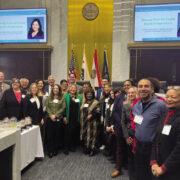I HAVE previously written about provisional waivers, where certain people are not eligible to adjust status (be interviewed for a green card in the U.S.) and must depart the U.S. to be processed for an immigrant visa at the U.S. Embassy. These people could include:
• K-1 fiancées who did not marry the petitioner, but instead married someone else;
• Crewmen without the benefit of section 245(i), which means they were not petitioned before April 30, 2001;
• People who are out of status, without the benefit of section 245(i), and are being petitioned by an employer or relative (other than a U.S. citizen spouse or 21-year-old child).
If these people depart the U.S., they could be subject to the 10-year bar. The provisional waiver allows them to apply for “forgiveness” from the USCIS or waive the 10-year bar while they are still in the U.S., and before they leave. With an approved provisional waiver, there is the feeling of security they can depart and return to the U.S. without being subject to the 10-year bar.
However, there are reports that some consulates have determined, after the fact, that the petitioner’s affidavit of support (Form I-864) is insufficient (even though it was already cleared and approved by the NVC), because perhaps the consul believes the petitioner is not earning enough money, as reflected on the affidavit of support in relation to poverty guidelines. The consul then “temporarily” refuses the person’s visa based on “public charge,” and effectively voids or cancels the provisional waiver. While the consuls provide the applicant the opportunity to cure the documentary deficiency demonstrating sufficient financial resources (or submitting a co-sponsor’s affidavit of support), and will “reopen” the case, they nevertheless immediately revoke the provisional waiver upon making the public charge finding, and will not “reinstate” the provisional waiver once additional evidence or documentation is presented and the public charge finding has been overcome.
What this means is the previously approved provisional waiver is now canceled or void. As a result, the person is required to again apply for a waiver of the 10-year bar while abroad, even though the USCIS had already approved the provisional waiver on the very same grounds and facts. A new waiver could take months to process and unnecessarily increases USCIS’s workload by having them again process a waiver of a 10-year bar they had already approved.
Rather than creating this unnecessary additional burden on both the applicant and USCIS, the State Department should take a logical and common-sense approach and treat this deficiency like USCIS does with a request for evidence. The consul should request the evidence, and if the applicant timely submits the evidence, approves the case and issues the visa. After all, USCIS doesn’t deny cases when requesting additional evidence. Instead, the case is held in abeyance until the evidence is provided.
Anyone pursuing a provisional waiver should make sure the affidavit of support fully meets all the legal requirements, and the petitioner submitting the affidavit of support is earning sufficient income, because a “temporary” refusal based on public charge could result in the need to file a brand-new regular waiver of the 10-year bar, while waiting abroad.
* * *
Michael J. Gurfinkel has been an attorney for over 35 years and is licensed, and an active member of the State Bars of California and New York. All immigration services are provided by, or under the supervision of, an active member of the State Bar of California. Each case is different and results may depend on the facts of the particular case. The information and opinions contained herein (including testimonials, “Success Stories”, endorsements and re-enactments) are of a general nature, and are not intended to apply to any particular case, and do not constitute a prediction, warranty, guarantee or legal advice regarding the outcome of your legal matter. No attorney-client relationship is, or shall be, established with any reader.
WEBSITE: www.gurfinkel.com
Follow us on Facebook.com/GurfinkelLaw and Twitter @GurfinkelLaw
Call Toll free to schedule a consultation for anywhere in the US:
1-866-487-3465
(866) – GURFINKEL
Four offices to serve you:
LOS ANGELES · SAN FRANCISCO · NEW YORK · PHILIPPINES


